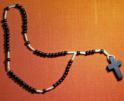
Faith
The cross of Christ draws and repels us simultaneously, and it reveals the unvarnished truths of human existence.

Wolfe
Holy Week is just around the corner, which means the biblical descriptions of Christ's Passion are, too. Whips, nails, a crown of thorns: the Gospel accounts are so familiar that it can be difficult to keep from glossing over the terrible suffering they record. The Sorrowful Mysteries and the Stations of the Cross are intended to help us in that regard. But the truth is that the realities of the crucifixion are hard to hear. Perhaps that's one reason why we find it hard to listen.
Another reason might be that the whole thing frightens us. And well it should. Few ways to die could be more painful. Add the humiliation, derision, and abandonment, and the scene quickly becomes unbearable. We have images -- many life-sized and some quite gruesome -- of Christ crucified in our churches. Yet when we come for Sunday Mass, we hardly notice as we walk up the aisle, genuflect, and take our seats in the pew.
All of that makes reading the Passion narratives on Palm Sunday and Good Friday jarring. Shouting "Crucify him! Crucify him!" makes us uncomfortable. And I'm pretty sure that's precisely the point of doing it. We'd all like to think that if we had been in Jerusalem on that terrible day, we would have spoken up, defended Jesus, or at the very least done something to help him. We imagine that, somehow, we would have handled it all better than Jesus' closest disciples did. The Gospels, however, don't allow us to cast ourselves as the heroes we wish we were. Instead, they bring us face-to-face with the truth that we aren't any better than those who were there.
Confronting the cross inevitably brings us to the question of who was to blame for Jesus' death. Jewish religious leaders? The Romans? Judas? Peter? A bloodthirsty God or a Savior with a death wish? But "Ah, Holy Jesus," an Episcopal hymn I loved as a child, takes that question a step further and answers it in a much more personal way.
"Who was the guilty? Who brought this upon thee?
Alas, my treason, Jesus, hath undone thee!
'Twas I, Lord Jesus, I it was denied thee;
I crucified thee."
The cross of Christ draws and repels us simultaneously, and it reveals the unvarnished truths of human existence. Laying down our lives for others is painful. Making a sacrificial gift of self doesn't come with a guarantee that someone somewhere sometime will be grateful. Life is heavy, and the journey is always uphill. We aren't as good as we should be, and sometimes, we don't even want to be good.
But once we begin to look into the cross and not just at it, once we can look past the blood and see the love, the ugliness of Christ's suffering and death becomes beautiful. In fact, the crucifixion of Jesus Christ becomes the standard of beauty by which we begin to measure everything else. And when it does, the cross can also become the standard by which we live as well.
Holy Week brings us to contemplation at the foot of the cross. When we truly acknowledge our sinfulness and recognize the depths of our selfishness, we begin to understand that God's love is greater and deeper still. When we see how much Jesus suffered, we realize that we -- and all God's children -- are worth suffering for.
And when we turn our eyes and hearts toward the Via Dolorosa, we discover that the road of the cross is our road, too. We cannot follow Jesus without taking up our own crosses willingly and every day. That is, we cannot become like Christ until we too are crucified, offering ourselves for others and making ourselves -- and our whole lives -- a sacrificial gift.
- Jaymie Stuart Wolfe is a Catholic convert, wife, and mother of eight. Inspired by the spirituality of St. Francis de Sales, she is an author, speaker, and musician, and provides freelance editorial services to numerous publishers and authors as the principal of One More Basket. Find Jaymie on Facebook or follow her on Twitter @YouFeedThem.
Recent articles in the Faith & Family section
-
Scripture Reflection for Nov. 3, 2024, Thirty-First Sunday in Ordinary TimeFather Joshua J. Whitfield
-
Hurricane Helene: Subsidiarity and solidarity in actionDr. R. Jared Staudt
-
What is the church's teaching on transgender issues?Jenna Marie Cooper
-
The people who pray for usJaymie Stuart Wolfe
-
Welcoming Archbishop HenningFather Robert M. O'Grady


















